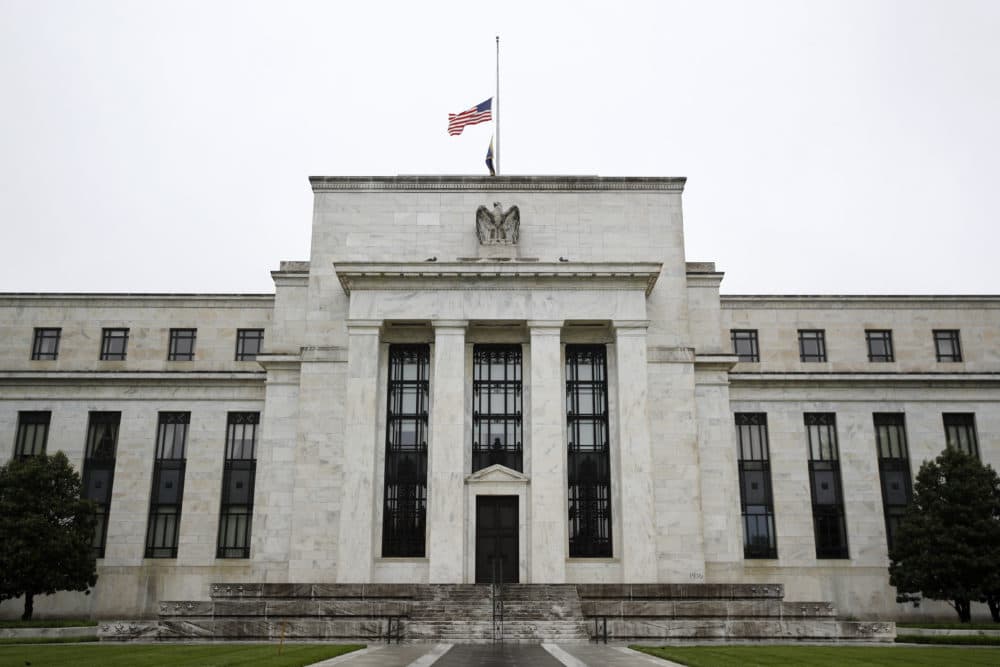Advertisement
Record Corporate Debt Is Helping Push Iconic Companies Into Bankruptcy
Resume
Rental car giant Hertz is the latest big American company to file for bankruptcy as the economic pain of the coronavirus pandemic deepens.
Hertz was burdened by debt — and the company is far from alone. Even before the virus seeped into the U.S., corporate debt was soaring to new highs.
Now, the Federal Reserve is taking the unprecedented step of buying corporate bonds to help companies avoid bankruptcy and layoffs.
Dallas Federal Reserve President Robert Kaplan warned about the dangers of ballooning corporate debt long before the pandemic triggered an economic catastrophe.
“My concern is if you have a downturn where we grow more slowly, it means that this amount of debt could be an amplifier,” he said on CNBC in November.
And Kaplan was right: Now in late May, big American companies such as J. C. Penney, J. Crew and Neiman Marcus are losing so much money they can’t repay their loans on time.
"Well, this is a little worse than the downturn that I had in mind. I mean, this is a severe shock,” Kaplan says.
He says the shock is worse because companies have borrowed prodigiously in the past decade. Corporate debt has nearly doubled to $10 trillion since 2007 — and the Fed policy is a big reason why.
"I think the most significant is interest rates have been very, very low,” he says.
It's not just retail giants gobbling up cheap money. Oil and gas companies took advantage of basement-level interest rates for years, fueling a shale boom that made the industry rich.
But global demand for oil is on the skids. And the Fitch Ratings Company predicts that $43 billion worth of energy sector bonds and loans will default this year. Kaplan says it’s already happening.
"If you had a strong balance sheet going into this and had a lot of staying power, you have a much better chance to make it through what's going on with the lack of oil demand,” he says. “If on the other hand, you were going into this with a high level of debt or less than investment grade, it's been very challenging to make it through this period.”
He says that’s why many companies are experiencing bankruptcies and restructurings right now.
Some economists have called this corporate debt a bomb waiting to go off.
"That is part of capitalism and how capitalism works,” he says. “Is it a bomb? I don't think it's a bomb about to go off, but I think it's created strain for companies. And we're monitoring it here at the Fed very, very carefully."
In fact, the Fed is doing more than monitoring. In March, the central bank said it would buy up corporate bonds to act as a financial backstop. It had never done that before, and it prompted a rush to borrow even more in recent weeks.
Companies like Boeing, Nike, Disney and many others have issued bonds at record levels with hundreds of billions of dollars. Kaplan calls it a “very sensible approach,” saying the money will buy companies time to get through the crisis.
But there is a good chance this pandemic will go on much longer. Then what? Kaplan says he expects the economy to contract severely in the second quarter and then start growing again by late summer.
"We'll still end the year having had a contraction, let's say, in the range of 4.5% to 5%," he says. But that’s under the best circumstances.
He says the economic results will “depend heavily on” coronavirus testing, contact tracing, avoiding a second wave of the virus, and either the development of a treatment or vaccine — which means all the fiscal policy in the world will have limited effect as long as the disease keeps raging.
Cassady Rosenblum contributed to this report.
Peter O'Dowd produced and edited this interview for broadcast with Eileen Bolinsky. Serena McMahon adapted it for the web.
This segment aired on May 26, 2020.
